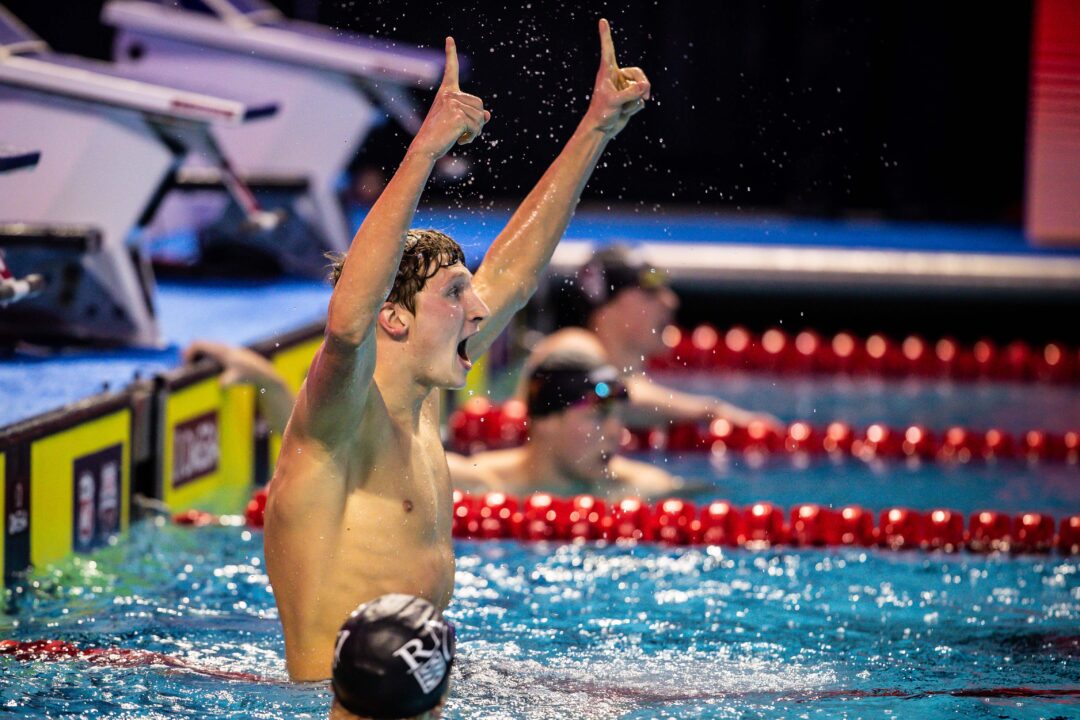“Growth mindset,” a term coined by psychologist Carol Dweck, refers to the belief that one can develop and improve their abilities through dedication, effort, and passion. To have a growth mindset means to look at failure and challenges as opportunities to learn and progress. There is no black-or-white way to approach a task, and one’s potential is not predetermined—rather, it is limitless.
Since Dweck established the term, the concept of a growth mindset has become fundamental in many high level academic and athletic programs.
Although adopting a growth mindset is relevant for all sports, swimming can be a particularly difficult sport to apply it to, as the sport is incredibly unforgiving. Winning or losing a race can come down to the slimmest of margins, and the smallest error can be the difference between a gold medal and finishing off the podium entirely. And then, even when swimmers do show success, fans are already looking for the next barrier to be broken while critics are picking apart what a swimmer could have or should have done better.
Take Gretchen Walsh for example, who, despite rewriting the record books at NCAAs two years in a row, has been relentlessly criticized for her ‘slow reaction times’ or not being able to replicate the same feats in the long course pool.
High expectations can make it difficult for elite swimmers to maintain a growth mindset, with many swimmers, such as Gretchen Walsh and Carson Foster, opening up about their mental health and self-confidence after disappointing qualifying meets (Olympic Trials).
Since then, both Walsh and Foster have taken to social media to discuss how their mental blocks affected their results and how high-pressure situations created self-doubt, which inevitably led to a fixed mindset—the idea that one’s abilities are innate and cannot be expanded.
However, the two show that it is possible to bounce back from such challenges, and have since adapted new perspectives on swimming. Instead of being defined by their setbacks, they learn and understand what not to do, which allows them to alter their mindset for future meets. Foster ended up qualifying for the 2022 and 2023 World Championships while Walsh qualified for the latter. How they reacted—by working to develop a growth mindset—after encountering a disappointing situation is what allowed them to succeed.
A few disappointing meets do not define who they are as swimmers and it most certainly does not undermine their accomplishments. It is essential to remember that your self-worth is not tied to your results, and unfavorable outcomes can be turned into learning opportunities.
In addition, it’s important to look at the aspect of talent versus hard work with a growth mindset since talent and genetics can often play a tremendous role in swimming. Many swimmers have been labeled ‘age group phenoms’ after they swim a mind-boggling time at ten years old, while even more have been labeled generational talents, or the ‘next Michael Phelps.’ It is incredibly easy to look at swimmers such as those with a fixed mindset and believe that some people are born lucky and have been gifted with incomprehensible talent that hard work can never catch up to. When we work hard but receive lesser results than another who may naturally excel at the same task, a natural response is to be angry, frustrated, discouraged, or confused. However, others’ performances don’t affect your own, and thus being frustrated at another’s result is ineffective. In fact, this mindset will almost always hinder one’s potential because it sets a limitation on your capabilities—that you can never be better than someone who is naturally gifted.
Many swimmers have proven just how mistaken a fixed mindset is. David Johnston, a USA National Swimming Team member, for example, posted his journey on his Instagram: at 16, he had no sectional qualifying times but was ultimately able to achieve his dreams by persevering through failure. He had taken a break from swimming for 8 months and believed that because he was behind everyone his age, he should quit. This fixed mindset nearly led to the absence of an incredible swimmer. He explains that with the help of Chester Barnard’s quote and ultimately the adaptation of a growth mindset, he returned to the sport. The quote:
“To try and fail is at least to learn; to fail to try is to suffer the inestimable loss of what might have been.”
Since then, he has become an American record holder in the 800m Free (SCM), was the 2023 NCAA runner-up in the 500-yard free, and was the national champion in the 400 Free at last year’s world championship trials.
At the end of the day, realizing that you have full autonomy over how you handle your challenges is what will lead to success. By believing in yourself and your potential for growth, you can overcome challenges and achieve bigger and better things. Talent matters, but it’s not about talent alone. The dedication, effort, and passion you put in that can lead to success. So embrace a growth mindset, persevere through failure, and don’t let setbacks define you.

I wrote an article with Carol Dweck taking her Mindset to swim coaching:
https://howieschein.com/uniswimming/MindsetHomePg.htm
Growth mindset: “The ability to learn is not fixed, that it can change with your effort.” Watch this Ted Talk: https://www.youtube.com/watch?v=H14bBuluwB8&t=79s
where’s steve friederang…
What head coaching jobs are currently open in D1? Texas A&M women, penn state…
Nice article, Claire!